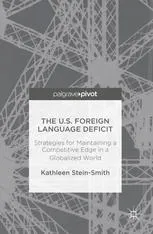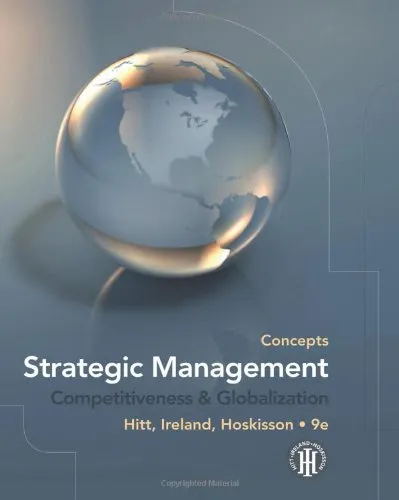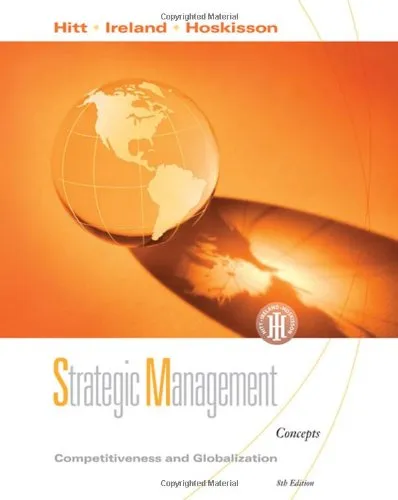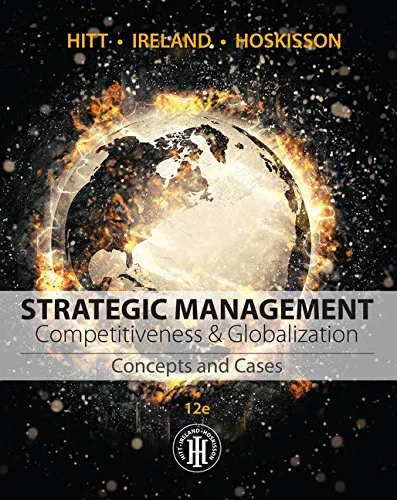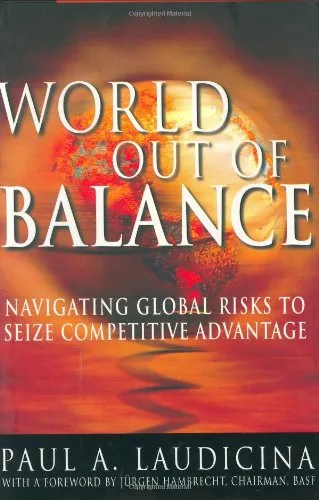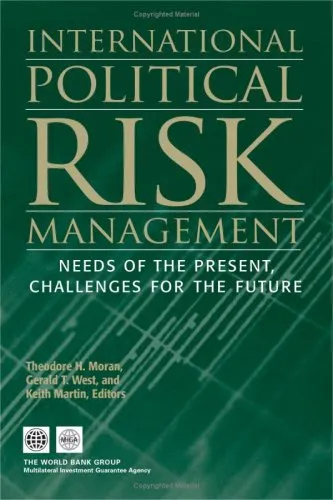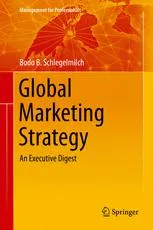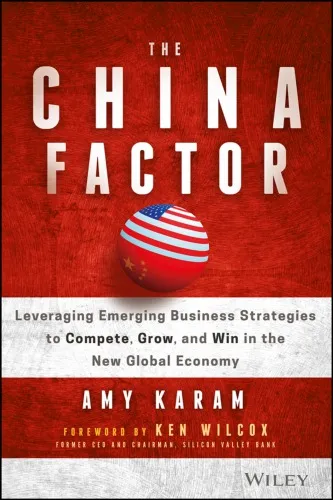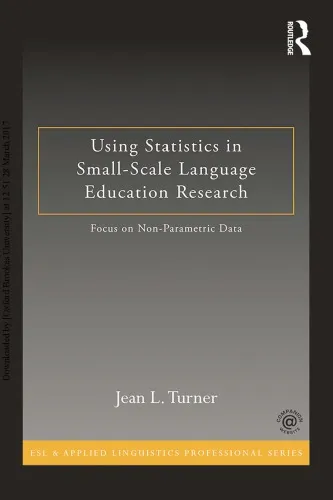The U.S. Foreign Language Deficit: Strategies for Maintaining a Competitive Edge in a Globalized World
4.0
بر اساس نظر کاربران

شما میتونید سوالاتتون در باره کتاب رو از هوش مصنوعیش بعد از ورود بپرسید
هر دانلود یا پرسش از هوش مصنوعی 2 امتیاز لازم دارد، برای بدست آوردن امتیاز رایگان، به صفحه ی راهنمای امتیازات سر بزنید و یک سری کار ارزشمند انجام بدینکتاب های مرتبط:
معرفی کتاب: The U.S. Foreign Language Deficit: Strategies for Maintaining a Competitive Edge in a Globalized World
کتاب The U.S. Foreign Language Deficit: Strategies for Maintaining a Competitive Edge in a Globalized World اثر Kathleen Stein-Smith، به یکی از مهمترین چالشهای قرن بیستویکم در جامعه آمریکا میپردازد: کمبود دانش زبانهای خارجی و تأثیرات آن در جهانیشدن. این کتاب یک تحلیل جامع و قابلفهم از وضعیت فعلی خسران زبانی در ایالات متحده ارائه میدهد و ضمن بررسی پیامدهای اقتصادی، فرهنگی و اکادمیک این نقصان، استراتژیهای مؤثری برای بهبود این شرایط پیشنهاد میکند.
ما در دنیایی زندگی میکنیم که به سرعت به سوی تعاملات میانفرهنگی و بینالمللی بیشتر حرکت میکند. توانایی ارتباط به زبانهای مختلف یکی از ارکان اساسی برای موفقیت در این محیط رقابتی است. این کتاب بررسی میکند که چگونه کمبود مهارتهای زبانی میتواند به کاهش توانایی رقابت اقتصادی، دیپلماتیک و فرهنگی یک ملت منجر شود. از این منظر، این اثر نه تنها به سیاستمداران، بلکه به آموزشدهندگان، پژوهشگران، و تمامی افرادی که در حوزه توسعه بینالمللی مشغول هستند، مخاطب قرار میگیرد.
خلاصهای جامع از کتاب
در این اثر، Kathleen Stein-Smith ابتدا به بررسی معنای "Language deficit" (کسری زبانی) و تأثیرات گسترده آن در محیطهای تجاری، سیاسی و آموزشی میپردازد. نویسنده تأکید میکند که مهارت چندزبانه نه تنها برای همکاریهای بینالمللی بلکه برای درک بهتر فرهنگهای مختلف ضروری است. در ادامه، علتهای این کمبود زبانی در جامعه آمریکا به تفصیل ارائه میشود، از جمله سیاستهای آموزشی نادرست، عدم تمرکز فرهنگی بر یادگیری زبانهای خارجی، و انتقال ناقص اولویتهای زبانی در مدارس و دانشگاهها.
بخش دوم کتاب با استناد به پژوهشهای مختلف و تجزیهوتحلیل آماری، تأثیرات اقتصادی گسترده این مسئله را بررسی میکند. نویسنده مثالهای ملموسی از محیط کار جهانیشده امروز ارائه میدهد که در آنها توانایی صحبت کردن به زبانهای متعدد یک مزیت رقابتی برای شرکتها ایجاد کرده است. همچنین، او موضوعات دیگری از جمله دیپلماسی زبانی و نقش زبان در امنیت ملی را بررسی میکند. سرانجام، کتاب استراتژیهایی ملموس و اجرایی برای تغییر وضعیت فعلی پیشنهاد میدهد، شامل اصلاحات در سیستم آموزشی، مشارکت فناورانه و پشتیبانی از فعالیتهای فرهنگی و هنری مرتبط با زبانها.
نکات کلیدی کتاب
- کمبود مهارتهای زبان خارجی در ایالات متحده پیامدهای منفی اقتصادی، فرهنگی و سیاسی دارد.
- امروزه مهارتهای چندزبانه در فضای بینالمللی کسبوکار و دیپلماسی بهعنوان یک ضرورت شناخته میشود.
- کتاب سه استراتژی کلیدی برای برونرفت از وضعیت فعلی ارائه میدهد: اصلاح سیستم آموزشی، تقویت فرهنگ چندزبانه، و توسعه استفاده از فناوریهای مدرن.
- نویسنده تأکید دارد که یادگیری زبانهای خارجی از سنین پایین باید آغاز شود تا تأثیر بیشتری برجای بگذارد.
جملات معروف از کتاب
"In a globalized world, the ability to communicate effectively across languages and cultures is not a luxury—it is a necessity."
"Education systems that ignore foreign language learning are setting future generations up for failure on the global stage."
چرا این کتاب مهم است؟
کتاب The U.S. Foreign Language Deficit برای تمامی افرادی که به توسعه مهارتهای میانفرهنگی و تواناییهای رقابتی علاقهمند هستند، اثر ارزشمندی محسوب میشود. با افزایش اهمیت ارتباطات بینالمللی، نقص در مهارتهای زبانی میتواند آینده اقتصادی و دیپلماتیک آمریکا را تهدید کند. این کتاب نه تنها وضعیت فعلی را مورد بررسی قرار میدهد، بلکه نقشه راهی برای بهبود مهارتهای زبانی و فرهنگی نسلهای آینده ارائه میدهد.
اهمیت این موضوع نه فقط در تاریخ معاصر، بلکه در آینده نیز احساس خواهد شد. بنابراین، این کتاب دعوتی است به رهبران، مربیان و حتی خانوادهها تا اقداماتی عملی برای تقویت دانش زبانی انجام دهند. با رویکردی مبتنی بر دادهها و تحلیلهای دقیق، این کتاب یکی از تأثیرگذارترین آثاری است که میتواند نقشی مهم در شکلدهی سیاستها و نگرشهای آموزشی ایفا کند.
Introduction to "The U.S. Foreign Language Deficit: Strategies for Maintaining a Competitive Edge in a Globalized World"
In an increasingly interconnected and globalized world, proficiency in foreign languages is no longer a luxury but an essential skill for individuals and nations alike. "The U.S. Foreign Language Deficit: Strategies for Maintaining a Competitive Edge in a Globalized World" is an exploration of the challenges posed by America's lack of fluency in languages other than English and its implications for society, business, education, and diplomacy. Authored with a deep commitment to bridging the gap between aspiration and action, this book provides a comprehensive analysis of the issue and offers pragmatic solutions to foster linguistic competence across the United States.
The United States faces a unique paradox. It is one of the most linguistically diverse nations in the world, yet many citizens and institutions remain monolingual. This foreign language deficit has significant economic, political, and cultural consequences. By examining both the roots and the impact of this issue, the book advocates for a paradigm shift in education and policy, urging a collective response to meet the communication demands of the 21st century. In this introduction, we will walk you through the key components of the book, its insights, and why it is a critical resource for anyone invested in the future of U.S. competitiveness and global engagement.
Detailed Summary of the Book
The book begins by outlining the foreign language deficit in the United States, exploring historical, cultural, and systemic factors that have contributed to this widespread linguistic shortfall. Through compelling data and analysis, it demonstrates how the lack of foreign language proficiency has created challenges for American businesses, weakened national security, and limited cultural understanding.
Moving forward, the book delves into the role of education systems in perpetuating the issue. It examines the gaps in curriculum design, funding, and teacher training, which have collectively hindered the development of multilingual citizens. The narrative then shifts focus to the workplace and government sectors, highlighting how these deficiencies diminish the nation’s ability to compete on the global stage and manage diplomatic relationships effectively.
Most importantly, "The U.S. Foreign Language Deficit" does not simply dwell on problems—it offers practical, research-backed strategies for change. These include policy recommendations, public-private partnerships, and grassroots initiatives aimed at encouraging language learning. The book inspires a sense of urgency while also instilling hope that meaningful change is within reach, provided there is collective action.
Key Takeaways
Readers of "The U.S. Foreign Language Deficit" will walk away with vital insights and actionable ideas. Some of the key takeaways include:
- The U.S. foreign language deficit stems from systemic educational shortcomings and cultural attitudes favoring English dominance.
- Foreign language skills are critical for economic competitiveness, national security, and fostering global citizenship.
- Successful strategies for tackling this issue include reforms in education, increased funding and support for language programs, and leveraging community resources.
- Developing multilingual skills is not just a societal benefit; it opens opportunities for individuals to thrive in an interconnected economy.
Famous Quotes from the Book
The following quotes capture the essence of the book's arguments and call for action:
"In a world defined by interdependence, language fluency is not merely an asset—it is a necessity."
"We cannot afford to ignore the multilingual reality of our world. Language is the gateway to understanding, collaboration, and progress."
"Education must be at the forefront of change. Only through systemic reform can we equip future generations with the skills to succeed globally."
Why This Book Matters
The importance of "The U.S. Foreign Language Deficit" cannot be overstated. At a time when global challenges require unprecedented collaboration, the inability to communicate across cultures and languages has far-reaching implications. This book highlights how the foreign language deficit limits not only the United States' economic and security potential but also its ability to be a leader on the world stage.
Moreover, as globalization continues to reshape the workplace, businesses are increasingly demanding multilingual employees who can operate across diverse markets. This book serves as a clarion call for policymakers, educators, and society at large to recognize foreign language proficiency as a vital skill for the future. By shining a light on this pressing issue, it empowers readers to contribute to the creation of a more linguistically capable and globally competent society. It is both a call to action and a roadmap for meaningful change.
دانلود رایگان مستقیم
شما میتونید سوالاتتون در باره کتاب رو از هوش مصنوعیش بعد از ورود بپرسید
دسترسی به کتابها از طریق پلتفرمهای قانونی و کتابخانههای عمومی نه تنها از حقوق نویسندگان و ناشران حمایت میکند، بلکه به پایداری فرهنگ کتابخوانی نیز کمک میرساند. پیش از دانلود، لحظهای به بررسی این گزینهها فکر کنید.
این کتاب رو در پلتفرم های دیگه ببینید
WorldCat به شما کمک میکنه تا کتاب ها رو در کتابخانه های سراسر دنیا پیدا کنید
امتیازها، نظرات تخصصی و صحبت ها درباره کتاب را در Goodreads ببینید
کتابهای کمیاب یا دست دوم را در AbeBooks پیدا کنید و بخرید
1182
بازدید4.0
امتیاز50
نظر98%
رضایتنظرات:
4.0
بر اساس 0 نظر کاربران
"کیفیت چاپ عالی بود، خیلی راضیام"
Questions & Answers
Ask questions about this book or help others by answering
No questions yet. Be the first to ask!
